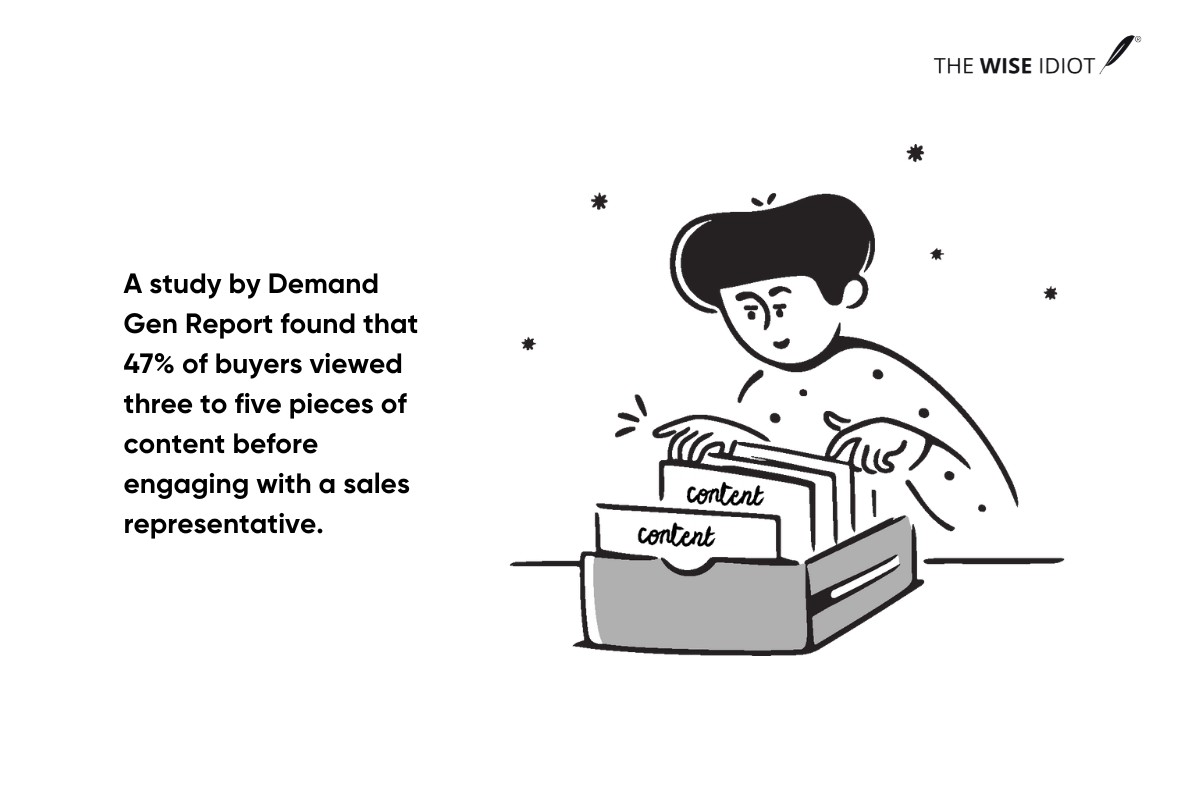You’re browsing online for a pair of sneakers, and you come across a website that not only showcases the latest sneakers styles but also provides you with valuable information on picking the right pair of sneakers for your foot type and how to care for your sneakers properly. The website’s content is so informative and helpful that you spend significant time on the site, reading and learning.
Now, what if I told you that this website is an example of content marketing? By providing valuable and relevant content to its audience, the website builds trust and establishes itself as an authority in the shoe industry. As a result, when you’re ready to make a purchase, this website will likely be at the forefront of your mind.
This is the connection between content marketing and sales. By offering your audience informative and enlightening information, you’re not only fostering a relationship with them but also establishing your company as an authority in your industry. This ultimately, in turn, leads to increased brand awareness, customer loyalty, and more sales.

A study by Demand Gen Report found that 47% of buyers viewed three to five pieces of content before engaging with a sales representative.
But it’s not just about creating any kind of content. To be effective, your content needs to be relevant to your audience’s needs and interests, and it needs to be delivered in a way that resonates with them. This requires a deep understanding of your target audience and their pain points and a strategic content creation and distribution approach based on the sales funnel.
Understanding the Sales Funnel
The sales funnel is a visual representation of a potential customer’s journey, from becoming aware of your product or service to making a purchase. The concept of a sales funnel is based on the idea that not all prospects are ready to purchase.
The sales funnel consists of four main stages:

Sales Funnel Graphs
Awareness
At the top of the funnel, potential customers become aware of your product or service. This stage is about creating brand awareness and attracting leads.
In the awareness stage, sales teams may struggle to attract leads and generate awareness of their product or service. This may be due to limited marketing resources or difficulty standing out in a crowded market.
Content marketing can address this challenge by creating valuable content that educates and engages potential customers.
For example, a blog post on how to clean or maintain your sneakers or a social media post on a series of inspirational quotes or images featuring people doing different activities while wearing the brand’s sneakers. This type of content can help the brand create an emotional connection with potential customers.
Interest
At this stage, potential customers have shown interest in your product or service. This stage is about nurturing these leads and providing them with more information about your product or service.
Avoid losing the interest of your leads at this stage by providing personalized content and gaining a deep understanding of their needs and preferences. Failure to do so may result in disengagement and missed opportunities to convert leads into loyal customers.
With content marketing, you can conquer the challenge of attracting potential customers by tailoring your content to their interests and pain points. Creating engaging eBooks, informative webinars, and insightful whitepapers will provide value that resonates with your audience and sets you apart from competitors.
Decision
At this point, prospective customers are thinking about making a purchase. They have researched and are evaluating your product or service against competitors. This stage provides them with the information they need to make an informed decision.
In the decision stage, the sales team faces the crucial challenge of providing relevant information to potential customers that can influence their purchase decisions. This could stem from inadequate knowledge about the product or difficulty in differentiating it from competitors.
Content marketing can help address this by creating comprehensive product descriptions, engaging comparison charts, and authentic customer reviews that instil confidence and trust in the buyer’s mind.

Example of content that gives you results during the decision-making stage
This sets you apart from your competitors and helps build a long-lasting relationship with your customers by providing the information they need to make informed decisions.
Action
At the bottom of the funnel, potential customers are ready to make a purchase. This stage is about making the buying process as easy as possible.
The final stage of the sales process can often be the most challenging – converting leads into customers. The sales team may struggle to close the deal due to the lack of trust or difficulty addressing objections from potential customers. However, content marketing can come to the rescue by creating engaging and compelling content that builds trust and overcomes objections.
Through powerful testimonials, case studies, and customer success stories, the sales team can showcase the real value of the product or service, leading to increased conversions and a long-lasting relationship with the brand. Using content marketing to build trust and address objections, you can convert leads into loyal customers and grow your business.
How Content Marketing Helps Sales Teams
Content marketing helps to speed up the sales cycle.
A Content Marketing Institute (CMI) report found that 61% of consumers are more likely to purchase from a company that produces custom content.
Effective content marketing also increases your company’s income and generates high-quality leads that will eventually convert into paying customers in the following way:
- Creating valuable and informative content that generates quality leads for your websites.
- Nurturing prospects by providing them with additional information that answers their questions and addresses their concerns.
- Establish your brand as a thought leader in your industry through content marketing, making prospects more likely to choose your products or services.
- Providing a range of content types that address different stages of the buying process can help prospects move through the funnel more efficiently.
For instance, HubSpot’s content marketing strategy focused on creating educational resources and informative content that addressed the pain points and needs of its target audience, which consisted of small and medium-sized businesses. They produced various content, including blog posts, ebooks, whitepapers, webinars, and podcasts.
Their content strategy was so effective that it helped to grow their blog’s traffic from 0 to 1.5 million monthly visitors within just a few years.
This helped them to establish themselves as a thought leader in the industry and build trust with their audience.
However, the real success of its content marketing strategy was reflected in its sales growth. HubSpot’s inbound marketing methodology, which is centred around creating valuable content to attract and convert leads, helped them achieve a 300% lead increase within a year. They also saw a 90% increase in customers, with their revenue growth from $5 million to over $100 million in just a few years.
The Benefits of Content Marketing for Sales Teams
Content marketing is the future of sales because it allows businesses to provide value to their customers before even asking for a sale. It not only helps attract new customers but also nurtures existing ones, leading to higher customer retention rates and increased customer lifetime value.
Here are some of the key benefits that sales teams can get from content marketing:
- Builds trust and credibility: Content marketing allows sales teams to share valuable information and insights with their prospects and customers, positioning themselves as experts in their field. It helps to build trust and credibility, making it easier for the sales team to close deals and win new business.
- Generates leads: By creating content that is targeted to your ideal customer, you can attract and generate leads that are more likely to convert into paying customers. This saves time and effort in the sales process, as the leads are already interested in what the sales team has to offer.
- Improves customer retention: After closing the deal, sales teams may increase customer loyalty and satisfaction by offering useful material. Repeat business and referrals result from this, which are essential to any sales team’s long-term success.
- Provides measurable insights: Content marketing provides you with a wealth of data and analytics that can be used to measure leads quality. This includes metrics like website traffic, engagement, and conversion rates, which can help you better understand the prospect.
Creating Effective Content for Sales Teams
Effective content is well-crafted, strategic, and designed to engage and convert the target audience.
The key elements of effective content are for boosting sales operations:

- Relevance: Effective content must be relevant to the target audience’s needs, interests, and pain points. It should offer solutions or information that the reader is actively seeking.
- Quality: The quality of the content, including grammar, spelling, and formatting, is essential for building trust with the audience. Poorly written or sloppy content can lead to a negative impression of the brand, which affects the sale process.
- Engagement: Your content should be engaging and capture the audience’s attention. You crack it through storytelling, visual aids, or interactive elements that encourage the audience to interact with the content.
- Credibility: Content that is well-researched and backed by reliable sources helps to establish credibility with the audience.
- Call-to-Action: Effective content should include a clear call-to-action that encourages the audience to take the desired action, such as signing up for a newsletter, making a purchase, or scheduling a consultation.
Additionally, the collaboration between marketing and sales teams is crucial in creating effective content that drives revenue. Marketing can provide insights into the target audience and develop a content strategy, while sales can provide feedback on what messaging resonates with customers.
This collaboration ensures that content is aligned with the sales goals and meets the needs of the audience. By incorporating these key elements into their content, businesses can create effective marketing materials which boost sales and increase revenue.
Revamp Your Sales Strategy With an Effective Content Marketing Approach
Are you struggling to meet your sales goals with outdated and ineffective methods? It’s time to invest in content marketing!
With the appropriate content marketing approach, you can improve website traffic, create leads, boost conversions, and speed up deal closing. However, when it comes to content marketing, not all can create equality.
That’s why a team with experience, expertise, and creativity is required to help you achieve your sales goals. And that’s where The Wise Idiot comes in! As a leading content marketing agency, we offer a range of services designed to help your business grow its revenue and establish your brand as a thought leader in your industry.
Frequently Asked Questions
Q1. What is the best way to provide content to your sales team?
Ans: The best way to provide content to your sales team is through a centralized database accessible to all members. This ensures consistency, easy access, and alignment with sales objectives.
Q2. How can marketing support the sales team?
Ans: Marketing can significantly support the sales team by providing them with the tools and resources they need to succeed. Here are a few key ways:
- Content creation: Develop high-quality content like case studies, product brochures, and email templates that address common customer pain points and showcase the value proposition.
- Sales enablement: Train the sales team to effectively use marketing materials during interactions with prospects and customers.
- Lead generation: Marketing can generate qualified leads through targeted campaigns, nurturing them until they are sales-ready.
Q3. What is the aim of content marketing?
Ans: Content marketing has several goals, but the ultimate goal is to attract and engage a target audience and convert them into customers. By creating informative and valuable content, you can establish yourself as a thought leader in your industry, build trust with potential customers, and nurture leads throughout the buyer’s journey.











